Mechanisms of Trust: News Media in Democratic and Authoritarian Regimes
Autor Jan Mülleren Limba Engleză Paperback – 19 sep 2013
This study examines the relationship between the media and the government in authoritarian regimes and Western democracies, focusing on how political structures affect the level of trust between the public and the news media. Surprisingly, Jan Müller finds that there is a higher level of trust among citizens of authoritarian regimes. To help reassert trust in the media, Müller argues that in democratic societies, a differentiated media system with interventions of the state to ensure plurality—in the form of public service media, for example—leads to trust in the news media.
Preț: 307.28 lei
Preț vechi: 392.71 lei
-22% Nou
Puncte Express: 461
Preț estimativ în valută:
58.80€ • 60.22$ • 48.92£
58.80€ • 60.22$ • 48.92£
Carte indisponibilă temporar
Doresc să fiu notificat când acest titlu va fi disponibil:
Se trimite...
Preluare comenzi: 021 569.72.76
Specificații
ISBN-13: 9783593398594
ISBN-10: 3593398591
Pagini: 250
Ilustrații: 35 halftones
Dimensiuni: 140 x 213 x 15 mm
Greutate: 0.3 kg
Editura: CAMPUS VERLAG
Colecția Campus Verlag
ISBN-10: 3593398591
Pagini: 250
Ilustrații: 35 halftones
Dimensiuni: 140 x 213 x 15 mm
Greutate: 0.3 kg
Editura: CAMPUS VERLAG
Colecția Campus Verlag
Notă biografică
Jan Müller received a doctoral degree in political science at Jacobs University, Germany, worked as a postdoctoral researcher at the Center for the Study of Democracy, and currently works as an analyst for the market research company Ipsos.
Cuprins
1. Introduction
1.1 Trust in Democratic Institutions
1.2 Trust in the News Media
1.3 Summary
Part I: Theoretical Framework
2. Trust
2.1 Defining Trust
2.2 Reducing Complexity
2.3 A Rational-Choice Notion of Trust
2.4 Cues for Trustworthiness
2.5 Trust and Modernity
2.6 A Decrease in Familiarity
3. Trust in the News Media
3.1 Market-Oriented Theory of the Public Sphere
3.2 Deliberative Theory of the Public Sphere
3.3 Critical Theory of the Public Sphere
4. Summary and Hypotheses
4.1 Trust and the Market-Oriented Theory of the Public Sphere
4.2 Trust and the Deliberative Theory of the Public Sphere
4.3 Trust and the Critical Theory of the Public Sphere
Part II: Analysis and Findings
5. Measuring Trust in the News Media
5.1 Operationalizing Trust in the News Media
5.2 Assessing Trust
5.3 Is the Loss of Trust in Democratic Countries a Result of Survey Research Bias?
5.4 Summary
6. Trust in the News Media over Time and across Countries
6.1 Trust in the Printed Press in Western Europe, Canada and the USA
6.2 Trust in the Printed Press, Television and Radio in Western Europe
6.3 Trust in the News Media in the USA
6.4 Trust in the News Media in Countries with Democratic and Authoritarian Regimes
6.5 Summary
7. Trust and Emancipative Values
7.1 Individual-Level Predictors of Trust in the News Media
7.2 The Operationalization of Emancipative Value Change
7.3 Emancipative Values and Trust in the News Media
7.4 Trust in Commercial-, Public Service-, and User-Generated News Media
7.5 Summary
8. Trust and the Processing of Information
8.1 The Elaborative Processing of Political Information
8.2 Need-for-Cognition and Surveillance Gratification
8.3 Trust and Diversity of the News Media
8.4 Summary
9. Consequences of Trust
9.1 Political Knowledge and Political Action
9.2 Knowledge of the European Union and the Frequency of Discussing Political Matters
9.3 Summary
10. Conclusions
10.1 Summary of the Findings
10.2 Dynamics of Trust in the News Media
10.3 Trust and Institutions
10.4 Public Sphere and Democracy
10.5 The (Ir)relevance of Trust in the News Media
References
Index
1.1 Trust in Democratic Institutions
1.2 Trust in the News Media
1.3 Summary
Part I: Theoretical Framework
2. Trust
2.1 Defining Trust
2.2 Reducing Complexity
2.3 A Rational-Choice Notion of Trust
2.4 Cues for Trustworthiness
2.5 Trust and Modernity
2.6 A Decrease in Familiarity
3. Trust in the News Media
3.1 Market-Oriented Theory of the Public Sphere
3.2 Deliberative Theory of the Public Sphere
3.3 Critical Theory of the Public Sphere
4. Summary and Hypotheses
4.1 Trust and the Market-Oriented Theory of the Public Sphere
4.2 Trust and the Deliberative Theory of the Public Sphere
4.3 Trust and the Critical Theory of the Public Sphere
Part II: Analysis and Findings
5. Measuring Trust in the News Media
5.1 Operationalizing Trust in the News Media
5.2 Assessing Trust
5.3 Is the Loss of Trust in Democratic Countries a Result of Survey Research Bias?
5.4 Summary
6. Trust in the News Media over Time and across Countries
6.1 Trust in the Printed Press in Western Europe, Canada and the USA
6.2 Trust in the Printed Press, Television and Radio in Western Europe
6.3 Trust in the News Media in the USA
6.4 Trust in the News Media in Countries with Democratic and Authoritarian Regimes
6.5 Summary
7. Trust and Emancipative Values
7.1 Individual-Level Predictors of Trust in the News Media
7.2 The Operationalization of Emancipative Value Change
7.3 Emancipative Values and Trust in the News Media
7.4 Trust in Commercial-, Public Service-, and User-Generated News Media
7.5 Summary
8. Trust and the Processing of Information
8.1 The Elaborative Processing of Political Information
8.2 Need-for-Cognition and Surveillance Gratification
8.3 Trust and Diversity of the News Media
8.4 Summary
9. Consequences of Trust
9.1 Political Knowledge and Political Action
9.2 Knowledge of the European Union and the Frequency of Discussing Political Matters
9.3 Summary
10. Conclusions
10.1 Summary of the Findings
10.2 Dynamics of Trust in the News Media
10.3 Trust and Institutions
10.4 Public Sphere and Democracy
10.5 The (Ir)relevance of Trust in the News Media
References
Index
